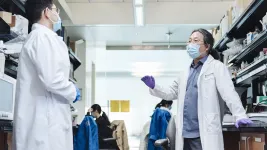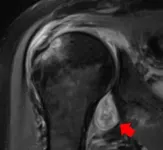(Press-News.org) People with asthma in the most deprived areas are 50% more likely to be admitted to hospital and to die from asthma compared with those in the least deprived areas, a new five-year study of over 100,000 people in Wales has revealed.
Those from more deprived backgrounds were also found to have a poor balance of essential asthma medications that help prevent asthma attacks.
The new research, published in the journal PLOS Medicine, was conducted by Swansea University's Wales Asthma Observatory in collaboration with Asthma UK Centre for Applied Research and Liverpool University, and found that people with asthma in deprived areas of Wales have worse outcomes.
Jointly funded by Health and Care Research Wales and Swansea Bay University Health Board, the study discovered that people with asthma from socially and economically deprived areas of Wales have less control of their asthma, suffer from more asthma attacks and are at a higher risk of death.
Dr Mohammad Al Sallakh of Swansea University, the first author of the study, said:
"This study demonstrates that asthma burden is not evenly distributed within the society, but it is affected by where people were born and live. We found that lower income and education levels are important drivers of socioeconomic inequalities in asthma.
Lack of educational opportunities likely affects how well people manage their asthma and puts them at higher risk of asthma attacks and death. It is important to target the most deprived communities with better health education strategies to ensure patients regularly and correctly use their preventive inhalers."
This study forms part of an important and increasing body of work into asthma-related health research led by the Asthma UK Centre for Applied Research. The Wales Asthma Observatory (WAO) is the latest Centre of Excellence to join the Population Data Science group. WAO is a platform for asthma research and surveillance with a cumulative cohort of asthma patients covering most of Wales and is based on electronic health records dating back to 1990.
WAO lead and Professor of Respiratory Medicine at Swansea University Medical School, Gwyneth Davies, said:
"We found that poorer people are three times more likely to use excessive reliever inhalers and had a worse balance of preventer to reliever medications, which means they are at higher risk of preventable asthma attacks and deaths. This study highlights an urgent need to identify ways to improve asthma outcomes for those from deprived communities."
This study looked at over 100,000 people with treated asthma across Wales over five years.
The authors probed routinely collected primary and secondary care data from within SAIL Databank based at Swansea University Medical School, which contains 100% secondary care and 80% primary care data for the population of Wales. SAIL Databank also hosts the UK data facilitated by BREATHE - The Health Data Research Hub for Respiratory Health.
Professor Ronan Lyons, lead for Public Health Research at Health Data Research said,
"This study shows the benefits that Trusted Research Environments, such as the SAIL Databank, play in enabling research that changes lives to be undertaken whilst protecting the privacy of patients' data."
The authors used SAIL Databank to link data for the period of 2013 to 2017 to investigate the link between GP care data, emergency hospital admissions, prescriptions and asthma deaths together with geographical and socioeconomic measures for ranked areas of deprivation.
Professor Sarah Rodgers, lead of the Care and Health Informatics theme in the ARC NWC said,
"This study shows the importance of empowering patients to actively manage their health conditions. We need to work with people in deprived communities to understand what would best help them access preventive asthma treatments."
INFORMATION:
Notes to Editors
Swansea University is a world-class, research-led, dual campus university offering a first-class student experience and has one of the best employability rates of graduates in the UK. The University has the highest possible rating for teaching - the Gold rating in the Teaching Excellence Framework (TEF) in 2018 and was commended for its high proportions of students achieving consistently outstanding outcomes.
Swansea climbed 14 places to 31st in the Guardian University Guide 2019, making us Wales' top ranked university, with one of the best success rates of graduates gaining employment in the UK and the same overall satisfaction level as the Number 1 ranked university.
The 2014 Research Excellence Framework (REF) 2014 results saw Swansea make the 'biggest leap among research-intensive institutions' in the UK (Times Higher Education, December 2014) and achieved its ambition to be a top 30 research University, soaring up the league table to 26th in the UK.
The University is in the top 300 best universities in the world, ranked in the 251-300 group in The Times Higher Education World University rankings 2018. Swansea University now has 23 main partners, awarding joint degrees and post-graduate qualifications.
The University was established in 1920 and was the first campus university in the UK. It currently offers around 350 undergraduate courses and 350 postgraduate courses to circa 20,000 undergraduate and postgraduate students. The University has ambitious expansion plans as it moves towards its centenary in 2020 and aims to continue to extend its global reach and realise its domestic and international potential.
Swansea University is a registered charity. No.1138342. Visit http://www.swansea.ac.uk
For more information:
Kevin Sullivan, senior press officer, Swansea University k.g.sullivan@swansea.ac.uk
Follow us on Twitter: http://www.twitter.com/SwanseaUni
Find us on Facebook: http://www.facebook.com/swanseauniversity
SAN FRANCISCO, CA--February 16, 2021--In people with central nervous system (CNS) lymphoma, cancerous B cells--a type of white blood cell--accumulate to form tumors in the brain or spinal cord, often in close proximity to blood vessels. This disease is quite rare, but individuals who are affected have limited treatment options and often experience recurrence.
Previous research has linked the severity of CNS lymphoma to abnormal leaks in the blood-brain barrier, a protective system that allows some substances to pass from the bloodstream to the brain, while blocking others. However, the specific molecular details of this link have been murky.
Now, Gladstone researchers have ...
Tsukuba, Japan - It's tough out there in the sea, as the widespread loss of complex marine communities is testament to. Researchers from Japan have discovered that ocean acidification favors degraded turf algal systems over corals and other algae, thanks to the help of feedback loops.
In a study published this month in Communications Biology, researchers from the University of Tsukuba have revealed that ocean acidification and feedback loops stabilize degraded turf algal systems, limiting the recruitment of coral and other algae.
Oceans are undergoing widespread changes as a result of human activities. These changes take the form of regime shifts - major, sudden and persistent changes in ecosystem structure and function. An example is the replacement of coral reefs and kelp ...
An estimated 1.1 billion people were living with untreated vision impairment in 2020, but researchers say more than 90 per cent of vision loss could be prevented or treated with existing, highly cost-effective interventions.
Published today in The Lancet Global Health, a new commission report on global eye health calls for eye care to be included in mainstream health services and development policies. It argues that this is essential to achieve the WHO goal of Universal Health Coverage (UHC) and the 2030 United Nations Sustainable Development Goals (SDGs).
Written by 73 leading experts from 25 countries, including University of ...
FEBRUARY 15, 2021, NEW YORK - A Ludwig Cancer Research study has identified a novel mechanism by which a type of cancer immunotherapy known as CTLA-4 blockade can disable suppressive immune cells to aid the destruction of certain tumors. The tumors in question are relatively less reliant on burning sugar through a biochemical process known as glycolysis.
Researchers led by Taha Merghoub and Jedd Wolchok of the Ludwig Center at Memorial Sloan Kettering Cancer Center (MSK) and former postdoc Roberta Zappasodi--now at Weill Cornell Medicine--have discovered that in a mouse model of glycolysis-deficient tumors, CTLA-4 blockade does ...
Durham, NC- Can stem cells alleviate lymphedema, a chronic debilitating condition affecting up to one in three women treated for breast cancer? Results of a phase I clinical trial released today in STEM CELLS Translational Medicine (SCTM) show there is a strong possibility that the answer is yes.
Lymphedema is swelling due to a build-up of fluid in lymph nodes - vessels that help rid the body of toxins, waste, and other unwanted materials- usually occurring in an arm or leg. While it can be the result of an inherited condition, its most common cause in the Western world is the removal of or damage to the lymph nodes during the course of cancer ...
CHICAGO --- Muscle soreness and achy joints are common symptoms among COVID-19 patients. But for some people, symptoms are more severe, long lasting and even bizarre, including rheumatoid arthritis flares, autoimmune myositis or "COVID toes."
A new Northwestern Medicine study has, for the first time, confirmed and illustrated the causes of these symptoms through radiological imaging.
"We've realized that the COVID virus can trigger the body to attack itself in different ways, which may lead to rheumatological issues that require lifelong management," said corresponding author Dr. Swati Deshmukh.
The paper will be published Feb. 17 in the journal Skeletal Radiology. The study is a retrospective review of data from patients who presented to Northwestern Memorial Hospital between ...
A woman's body shape--not only the amount of fat--is what drives stigma associated with overweight and obesity.
Fat stigma is a socially acceptable form of prejudice that contributes to poor medical outcomes and negatively affects educational and economic opportunities. But a new study has found that not all overweight and obese body shapes are equally stigmatized. Scientists from Arizona State University and Oklahoma State University have shown that women with abdominal fat around their midsection are more stigmatized than those with gluteofemoral fat on the hips, buttocks and thighs. The work will be published on February 17 in Social Psychology and Personality Science.
"Fat stigma is pervasive, painful and results ...
To provoke more interest and excitement for students and lecturers alike, a professor from Florida Atlantic University's College of Engineering and Computer Science is spicing up the study of complex differential mathematical equations using relevant history of algebra. In a paper published in the Journal of Humanistic Mathematics, Isaac Elishakoff, Ph.D., provides a refreshing perspective and a special "shout out" to Stephen Colbert, comedian and host of CBS's The Late Show with Stephen Colbert. His motivation? Colbert previously referred to mathematical equations as ...
Children are protected from severe COVID-19 because their innate immune system is quick to attack the virus, a new study has found.
The research led by the Murdoch Children's Research Institute (MCRI) and published in Nature Communications, found that specialised cells in a child's immune system rapidly target the new coronavirus (SARS-CoV-2).
MCRI's Dr Melanie Neeland said the reasons why children have mild COVID-19 disease compared to adults, and the immune mechanisms underpinning this protection, were unknown until this study.
"Children are less likely to become infected with the virus and up to a third are asymptomatic, which is strikingly different to ...
A new study, published in Bioscience, considers the future of ecology, where technological advancement towards a multidimensional science will continue to fundamentally shift the way we view, explore, and conceptualize the natural world.
The study, co-led by Greg Asner, Director of the Arizona State University Center for Global Discovery and Conservation Science, in collaboration with Auburn University, the Oxford Seascape Ecology Lab, and other partners, demonstrates how the integration of remotely sensed 3D information holds great potential to provide new ecological insights on land and in the oceans.
Scientific research into 3D digital applications in ecology has grown in the last decade. Landscape ...







